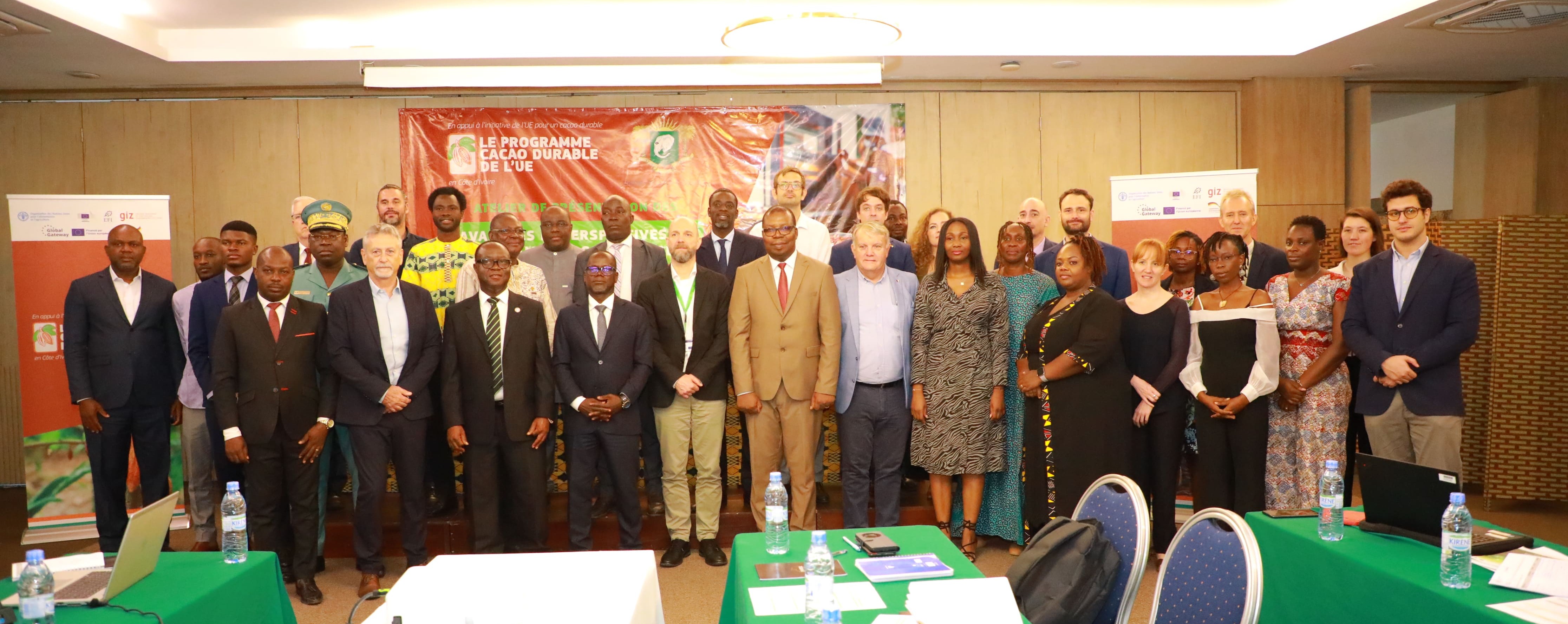The Sustainable Cocoa Programme: Improving the livelihoods of millions of cocoa farmers in Côte d'Ivoire

Key cocoa stakeholders in Abidjan, Côte d'Ivoire
©FAO/Kéi Dominique
On March 18, 2025, key stakeholders gathered in Abidjan for a workshop organized by the FAO Investment Centre and the European Union (EU) to assess the progress of the Sustainable Cocoa Programme (SCP) in Côte d'Ivoire. The event brought together Ivorian authorities and implementing partners, including the FAO Investment Centre, the Deutsche Gesellschaft für Internationale Zusammenarbeit (GIZ), the European Forest Institute (EFI) and the European Commission's Joint Research Centre (JRC).
Discussions centered on fostering the economic, environmental and social sustainability of the cocoa sector, with a strong emphasis on ensuring a decent income for smallholder cocoa farmers. Participants also explored strategies for supporting the implementation of the National Strategy for Sustainable Cocoa Farming (Stratégie Nationale de Cacaoculture Durable - SNCD) and aligning the sector with key European regulations, such as the EU Deforestation Regulation (EUDR) and the Corporate Sustainability Due Diligence Directive (CS3D).
A vision for sustainable cocoa and partnerships
Hervé Aka N'Zai, Head of the European Union-Côte d'Ivoire Cooperation Unit, highlighted cocoa’s vital role in the economy, "More than 6 million people in our country make their living from cocoa farming, a strategic sector of our economy that contributes 14% of GDP and 45% of our export earnings."
He went on to highlight the country's long-term vision for the industry: "Côte d'Ivoire's vision is to develop a cocoa value chain that is remunerative for producers, sustainable and respectful of the environment, where human rights are preserved and children are protected against all forms of exploitation and abuse."
As the world’s largest cocoa exporter, Côte d'Ivoire committed to creating a fair and sustainable cocoa value chain that supports small-scale producers, women, and youth. In 2022, the Government adopted a national strategy for sustainable cocoa, reinforcing its dedication to an environmentally friendly and equitable value chain.
Régis Meritan, Head of Agriculture and Growth at the European Commission's Directorate-General for International Partnerships (INTPA), highlighted “The EU and Côte d'Ivoire are moving towards the negotiation of an agreement on the facilitation of sustainable investment (AFID), with a specific annex devoted to sustainable cocoa" and continued: "This agreement represents the final stone in a long-term partnership between the EU and Côte d'Ivoire, aimed at ensuring the sustainability and competitiveness of the cocoa sector on the world market."
Supporting sustainable cocoa production
The SCP action plan focuses on three main objectives: improving the income and well-being of cocoa farmers, combating deforestation and eradicating child labour. Notably, the programme supports the Decent Income Differential (DID) initiative, a joint effort between Côte d'Ivoire and Ghana launched in 2019 to improve cocoa farmers' income.
In terms of sustainable production, the programme is supporting cooperatives in a pilot project to apply the ARS 1000 African regional standard - a set of guidelines for sustainable cocoa production – and promoting knowledge-sharing between Ivorian and Cameroonian experts on agroforestry issues.
Deforestation remains a challenge. Using a 2020 land use map, developed by Côte d’Ivoire’s National Office for Technical Studies and Development (BNETD) - with support from FAO, JRC and EFI - the programme enhances forest monitoring, strengthens deforestation warning systems and contributes to the protection of key biodiversity areas, including the Bossématié and Mabi Yaya classified forests.
The programme also addresses child labour in line with the 2022 national strategy for sustainable cocoa. It has mapped child protection structures in the Cavally region, supported the Ivorian Directorate for the Fight against Child Labour (DLTE) in implementing the Child Labor Monitoring and Observation System (SOSTECI) and studied the alignment of child labour prevention with the EU’s Corporate Sustainability Due Diligence Directive (CS3D).
Joseph Nyemah, FAO Representative in Côte d'Ivoire, emphasized: "The sector is facing a number of challenges, in particular the volatility of world prices and the effects of climate change. Even if market trends are currently favourable to producers, we must resolutely continue to support the sector to strengthen its resilience in the face of these various hazards."
As a key partner in the SCP programme, FAO plays a crucial role in promoting sustainable agricultural practices in the cocoa sector in Côte d'Ivoire. It actively contributes to monitoring deforestation, disseminating knowledge on agroforestry and building farmers' capacity, ensuring that environmental sustainability remains at the heart of cocoa production.
A USD 10 million-grant from the Green Climate Fund, designed and implemented with the technical support of FAO since 2020, supports Côte d’Ivoire’s efforts to reduce greenhouse gas emissions, build resilience and mitigate the effects of climate change. This is being achieved by stopping agriculture-related deforestation, improving agricultural productivity, conserving biodiversity, replenishing forest cover, and improving farmers’ livelihoods. The project supports around 7,550 farmers, a third of whom are women.
Investment in sustainable cocoa production
The Team Europe Initiative for Sustainable Cocoa Farming in Côte d'Ivoire (TEI) has committed €650 million (CFAF 426 billion) to enhance the economic, environmental and social sustainability of the country’s cocoa sector. In January 2025, the Banque Nationale d'Investissement de Côte d'Ivoire (BNI) and the European Investment Bank (EIB) launched a €100 million EU-backed partnership to support youth employment, gender equality and sustainability. Enabled by an EU guarantee, this initiative aligns with the Global Gateway strategy, promoting responsible investment in global supply chains while upholding high environmental and labour standards.
The EU-funded SCP programme, with a €35 million budget, directly benefits millions of Ivorians. As part of the EU’s support for Côte d'Ivoire’s cocoa sector, the SCP is implemented by key organisations, including the United Nations Children's Fund (UNICEF), the International Labour Organisation (ILO), the International Organisation for Migration (IOM), the Belgian Development Agency (ENABEL) and non-governmental organisations such as Information, Coordination, Conferences (INKOTA), Initiatives pour le développement communautaire et la conservation de la Forêt (IDEF) and the Centre de coopération internationale en recherche agronomique pour le développement (CIRAD).

